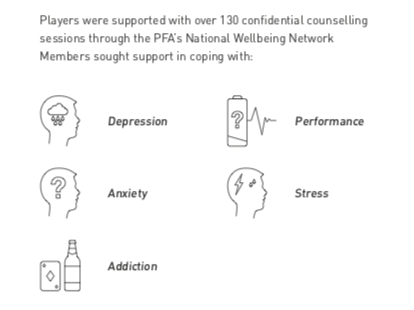During November, the PFA partnered with men’s health charity Movember to shine a light on player’s mental health issues.
Through the ‘Talking When Times Get Tough’ content series, Melbourne City FC’s Rostyn Griffiths opened up about his struggles with anxiety and panic disorder following the passing of his grandfather.
Newcastle Jets defender Nikolai Topor-Stanley spoke about the general struggles with maintaining happiness during relentless fixture congestion, while Tarek Elrich shared his journey of encouraging conversation during his rehab from serious injury.
While the Movember campaign provides the perfect opportunity to highlight men’s health issues, the PFA has committed to ensuring its members are supported all year round.
The PFA’s National Manager Player Development, Beau Busch, earlier this month visited FIFPro Europe in Hoofddorp in the Netherlands alongside 30 player unions to deliver a series of workshops on mental health.
“The conference was an ideal opportunity to connect and learn from each other as we continue to strive to provide the best possible support to our members,” Busch said.
“What was clear throughout was the deep commitment all FIFPro members have to ensuring the wellbeing of the players.”
According to FIFPro research, footballers are more likely to suffer from mental health issues than the rest of the population: 38 per cent of active professional players reported symptoms of depression in 2015, according to the study.
At the two-day workshop, footballers from countries including Cyprus, Finland, Montenegro and the Netherlands spoke about coping with stressful moments such as a career-ending injury, making a crucial mistake in matches and relocating abroad.
Jonas Baer-Hoffmann, FIFPro Europe Secretary General, said: “The public discourse around mental health in elite sport is changing and athletes are at the forefront of changing how society deals with these widespread health concerns.
“This is encouraging but at the same time most players don’t yet receive the required support themselves. The workshop is part of a wider initiative by FIFPro to build support systems for our players across our member countries.”
Over the course of the past 12 months the PFA has provided 130 confidential counselling sessions to players from its membership base, designed to provide critical support in times of need but also to assist them in dealing with the demands of professional sport.
The sessions provide advice for players who may be suffering from depression, performance or general anxiety, stress, addiction, relationship breakdown, grief and transition.
Busch said that the increasing number of members accessing the counselling sessions indicated that players were increasingly aware of the PFA’s support programs and services and were becoming more comfortable in accessing them.
“A critical focus for the program and been building an awareness of what wellbeing is, the factors that can have an impact on it and trust in the support services that are available to support members,” said Busch.
“The outstanding work of our
Player Development Managers has ensured that we have been able to build extremely trusting relationships with our members and football department staff in the clubs and National Teams and these relationships have been fundamental to the high levels of engagement in the whole program that we are now encouragingly seeing.”








